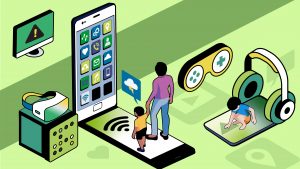
Mobile devices have many uses caregivers might find helpful—they allow them to check on work while spending time with others, can offer relief from boredom while kids play, can help with ordering groceries, tracking schedules, and coordinating child care—but there are downsides to being constantly connected. Devices allow us to multitask, which impacts the time spent with and the attention we give others.
What is Technoference?
Technoference is when a person’s technology use interferes with their relationships or social interactions, such as scrolling through social media at dinner or checking a text in the middle of a conversation. Technoference can impact every kind of relationship, whether it be a parent and child, friends and classmates, or even between parents.
How does Technoference Impact Children?
Many parents and experts worry that technoference hurts the parent-child relationship. Research shows that parents using phones around kids pay less attention, talk less, and have lower quality of conversations or interactions with their kids. This matters because children develop best with support and interaction from their parents.
Technoference also affects kids’ behavior and learning. When parents are distracted by devices, kids may “act out” to get their attention, and these behaviors can last for months. Caregivers who use their phones around their kids might miss these bids for attention, which means missed chances to guide learning and growth and can even lead to a caregiver giving an inappropriate response.
Babies are impacted by technoference, too. Babies learn by copying parents, and can’t do this as well if their parents are distracted. This means that parents who are distracted by their phones may be inadvertently preventing their babies from learning.
Teens are also affected. Teens whose parents are often distracted by devices report worse mental health, and can show more frequent and violent behavior than those whose parents are less distracted.
How does Technoference Impact Caregivers?
Technoference doesn’t just affect children—it can affect caregivers too. Parents report that using mobile devices when playing with their kids makes the experience less satisfying. Technoference can also make co-parenting harder. When phones interrupt parents while they are working together, it can cause stress by making it harder for them to coordinate and support each other.
What Can Parents Do?
Parents should pay attention to when and how they use their devices, and whether it takes away from quality time with their kids. Finding other ways to relax, connect with people, and have fun without a phone can make it easier to keep device use healthy. When you do turn to your device during an interaction, consider verbalizing to your child what you are doing and why (e.g., “I am adding that to our grocery list so I don’t forget.”). Remember that any rules set for the family (i.e., no devices at the dinner table) should be followed by parents as well, when appropriate, or be clear about exceptions when necessary (e.g., “I have my phone today because I am expecting a very important call from Grandma that I can’t miss.”).
The beeps and buzzes and phone calls can cause interruptions, but also the ways that we choose, either consciously or unconsciously, to use our devices around our families can start to influence that time together…[and] our children notice.









